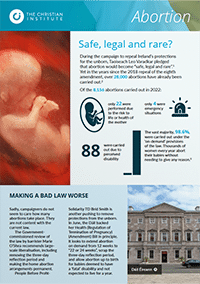Campaigners against a new technique for screening unborn babies for Down’s syndrome say that their concerns have been “constantly ignored” by the Government.
Don’t Screen Us Out argue that Non-Invasive Prenatal Testing (NIPT) will lead to an increase in abortions.
In England and Wales, recent figures show that 92 per cent of babies who are diagnosed with Down’s syndrome in the womb are aborted.
Review
NIPT is claimed to be 98 per cent accurate at predicting the likelihood of unborn children having Down’s syndrome.
Don’t Screen Us Out want to delay the introduction of the test until there is a full ethical review to ensure that NIPT complies with human rights obligations.
The NIPT programme “is projected to result in a profound increase in the number of children with Down’s syndrome screened out” by abortion, the group said.
These concerns are being constantly ignored by the Government. This must stop.
It added: “These concerns are being constantly ignored by the Government. This must stop.”
Conveyor belt
The Daily Mail reported that Whitehall sources were saying the Government is close to approving the test and bringing it to the NHS.
Lynn Murray has a daughter with Down’s Syndrome and speaks on behalf of Don’t Screen Us Out.
She spoke to Premier Radio about the impact of the proposed test saying: “As more women take it up it’ll become harder for people to spend time with them and counsel them to come to the best decision for them.
“So that’s the fear, that we will just simply become a conveyor belt of abortion for Down’s Syndrome.”
Fear
Murray also said: “Often the thing about Down’s Syndrome is that people fear it, people don’t know what it is.
“We need to be calm and think things through and look round us and think we should always have hope about the future.”
Statistics show that one in every 1,000 babies in the UK is diagnosed with Down’s syndrome.
A spokesman for the Department of Health said: “We are listening to everyone’s views on this important issue, and want women to make informed decisions and access safe and appropriate tests. We are considering this carefully and will make an announcement in due course.”


